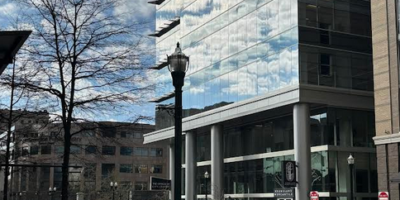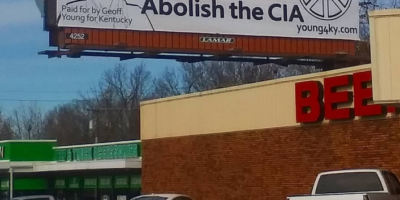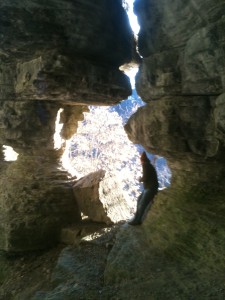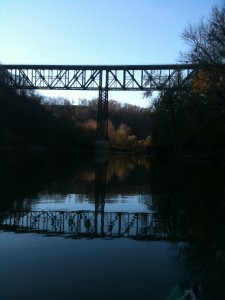Night falls on the Jessamine
By Northrupp Centre
Ideally, camp set-up is a self-organizing process. Decide upon a spot, disembark, lay out a tarp, unload dry-bags. Grab a drink or snack, set up tents, unpack and organize kitchen. If energetic, or if planning a night womp, empty boat and dump canoe-water. Collect firewood and centralize all trash. Explore singly or as group. Camps need not be neat, but the best have their own intrinsic order and efficiency.
Having paddled many rivers with my friend Gortimer T. Spotts, our camp set-up on Jessamine Creek was nearly impeccable. We had held out, resisted north-facing bottoms and muddy take-outs, twisted our way upstream through a shallow and narrow gravel channel, and then bull-horned through a thick, creek-spanning deadfall to arrive at our campsite: a rare sandy bank gently rising five feet above the water on an inside bend, the east side, a flat space just large enough for our tent, some gear and a fire.
Gortimer grounded his craft, grabbed a tarp and his bottle of Laphroig Quarter Cask, and made for the sand. By the time I had beached my vessel, my comrade had already laid out the tarp, taken several pulls from the scotch and returned to his boat to retrieve the two dry bags (one red, one blue) that carried our camp kitchen and tent and sleeping bags.
I pulled up next to Gortimer’s boat, disembarked, and looked into my canoe. When he had picked me up at the airport, Gortimer neglected to take into account the fact that my possessions, in addition to his, would need to make the trip. At our Camp Nelson put-in earlier in the day, I had discovered that Spotts brought no dry bags to hold the contents of my luggage, which meant I would have to paddle with both suitcases protruding out the bow of my boat.
When I pointed out the potential discomfort not having dry bags could ultimately cause me, Gortimer momentarily scratched his head and left to rummage around the seats of his Thunderbird, to see if he could “engineer a solution.” He returned ten minutes later, holding aloft two mostly-untorn, well-used Glad kitchen bags and some jute twine of differing sizes and wear, for me to “cinch things up” around my two pieces of luggage.
Four hours later, sitting beached at the foot of our Jessamine Creek campsite, my luggage stood upright in front of me, wrapped in sliced and diced Glad bags and sitting in the center point of a substantial puddle of canoe-water. I grabbed the two Glad-bagged handles, lifted, waited patiently for the water to drain through several small slits at the bottom, and hauled them up to the tarp.
Our efficient camp went up quickly and with little talk, a fugue of complementary chores. Gortimer set about constructing the tent. I unpacked and organized the kitchen, separating out our dinner ingredients. Gortimer grabbed water and a burner, started some coffee, then drifted off to collect firewood and pick through Ordivician creekside stones. I did a trash pickup, transferred some soggy clothes into the tent and dumped out my canoe before heading off on my own round of wood collecting and area sightseeing.
River Rat stew
Near dark, we reconvene next to a considerable pile of gleaned firewood, base camp, for cups of coffee, a bowl and more Quarter Cask. Around us late fall has set. At our shins, the campfire smokes, snaps, cracks. Beyond the fire a thin layer of hardy leaves continue to resist the November chill and cling to their trees. The palisades lift above us in all directions, at all angles.
Together we set about making some River Rat stew and passing around a bottle of port fished from the camp kitchen. Gortimer cuts the onions, garlic, and purple and yellow fingerlings, and tells me stories of the area’s history. In a large pot hanging from a tri-pod over the fire, I slow-cook the partially thawed hunk of boston butt, making a beef broth, and ready the black eye peas for dumping into the stew.
Mostly, though, I just listen to Gortimer and consume idly whatever he passes my way. As night falls on the Jessamine, our world quickly shrinks to a smoky perimeter radiating out from the fire. Just below us, now in darkness, the creek courses through a series of riffles, a steady loud pulse.
The tale Gortimer tells this night concerns his ancestor, John Robert (J.R.) Shaw, a British turncoat who in the 1790s arrived to the inner bluegrass from Ohio. Shaw had followed Jessamine Creek downstream through its namesake gorge, both he and the creek on their way to the Kentucky River, he digging wells and turning odd jobs for other newly arrived, newly American, settlers along his way.
According to Spotts family lore, Shaw had designed and constructed the limestone foundation of a mill once in use further up-river from our present camp site. Because of a reputation for the bottle and a propensity for befriending lonely farm girls (and some of their mothers), Shaw was forced to spend most of his nights while working nearby Jessamine Creek at a place my companion referred to only as Fraggle Rock, a cave located atop a waterfall that entered into the creek on river right, not much more than a mile away from where we sat.
By this time in the story, our River Rat stew already eaten and our bowls long since cleaned, Spotts has stood up and opened his weathered copy of Shaw’s Jessamine diaries, a family heirloom passed down since the 1800s from a Garrard County line (bastards all) of Shaw descendants, of which Spotts counts himself a proud member.
“April, 22, 1793,” Spotts read. “Found work quarrying Overstreet mill. Because of kind words from good Scotts’ at millhouse, cannot sleep in Overstreet home when Mrs. O’street is nearby….have found good shelter in a cave above a trickling water fall. Full view of valley and downward looks at sycamore crowns growing close upon the creek. No work today. Tonight leaving for Bethel Academy with two bottles to encounter the dames if fever subsides. Night swim in creek shall do us all good.”
By this time, the scotch had amplified Spotts’ voice and encouraged his arms into rhetorical accompaniment. Occasionally, he would interrupt the reading of his ancestor’s narrative with extemporaneous information and encouragement for the long dead tinker—“Atta boy John Robert!,” and “John Robert preferred apple whiskey, you know,” and the like. The result was a certain loving gravitas afforded to the tale: Gortimer orating to a gorge full of critters and wandering spirits struck silent.
I was entranced, though not for long. Shaw’s reference to a 207 year old night swim jerked Spotts from his recitation.
“Night womp. It’s time for a night womp. It’s a new moon tonight, the stars will be out on the river. It shall do us all good.”
With that, my bastard friend from Garrard County tossed Shaw’s diary onto the tarp and began looking through the kitchen supplies.
Starry Night
When he returned, Spotts carried in his left hand what appeared to be a handful of thickly bunched asparagus stumps with green leafy tops. “This’ll be good for star viewing,” he said. “It’s all organic. Qat, nature’s amphetimine. I traded some KP for this shit with a group of Yemeni WEGers I met last month at the Games.”
“KP?” I asked.
“Kentucky Proud. Those Yemenis were nuts. They were worried about finding fresh Qat in the states during the Equestrian Games—I know I wouldn’t touch the stuff if it gets to market after 48 hours—so the fuckers just filled part of their jet with potted qat plants. They parked the jet at the airport to harvest as needed. We ended up hitting it off, the Yemenis and I, so before they left, they gave me a couple leftover plants as a parting gift of friendship.”
I had spent much of my time during the Games with Gortimer. His revelation about the Yemeni WEGers explained a number of heretofore inexplicable instances of his disappearance.
“This one’s for you,” he said, offering me the bundle. I cupped the qat in both hands. “Take the leaves, stuff them in your mouth and chew them into a wad. Hold it like you would a chaw in your cheek. They’re bitter, but jesus, you’ll thank me when we’re on the water.”
Moments later I sit in my boat, a bunch of qat stuffed awkwardly between my legs, trying to feel my way past deadfall and shallow channels. I have been on creeks before at night when I have had to paddle directly into a full moon on the horizon. The feeling is unsettling: the moon’s light, and the light of its reflection off the water, render you functionally blind. I have run into ten-foot tall muddy creek banks without any foreknowledge, solely because I have forgotten to wear sunglasses while on the water at midnight.
Paddling on the Jessamine this night, the picture is the opposite—a seeming absence of moon and light—but the outcome is much the same. Blindness. I drift too far right and ground myself on a shallow bed. Eventually I break into less shallow water and float 10 minutes in complete black silence, letting the current take me to a light at the end of the tunnel, the Kentucky River. When I finally stream into the great river, the temperature, which has dropped steadily all night, stands somewhere around freezing. My mouth bulges with qat wad.
Coming upon the Kentucky from one of its feeder creeks is always an exercise in horizon-raising. On a creek, one quickly becomes used to the intimate feel of shallow twisty beds and over-hanging trees. Flowing into the Kentucky from one of its creeks, one inevitably looks up—at the opened sky, at the opposite banks 150 feet across the river, at the palisades a half-mile in the distance. The feeling coming onto the Kentucky, at least initially, is nearly always freeing.
To come upon the Kentucky on a clear, windless new moon night with a mouthful of qat is something else altogether. I put up my paddles, lean back and stare up at the night sky, the boat drifting slowly to the middle of the river. The world around me has turned light and dark, mostly dark. In the absence of moonlight, the river, its banks and palisades rising above it, have blurred into differing shades of gray and black. The line between palisade and night sky, between earth, water and air, is nearly indistinguishable.
I drift quietly on the river’s dark emptiness and note Orion’s Belt climb a distant palisade, pointing its way to Taurus and Pleiades, the Seven Sisters. Without a paddle in the water, I become completely detached from the world. For a long while I feel as if I am planing along the surface of the universe, unable to discern whether I am traveling at 2 knots per hour on the Kentucky River, or at 2 light years per second on a particularly clean belt of interstellar dust.
Ambush
As it turns out, I am probably traveling at speeds less than 2 knots per hour. In the time it takes me to chew, spit out, and reload an entire mouthful of qat (a time I approximate at 2 hours), the weather has dropped five degrees and I have drifted maybe 70 yards. This turns out to be 20 yards farther than Gortimer makes it.
Once reunited with my paddling partner, we toast our good fortune and begin slowly making way back to Jessamine Creek. With no light, little current and minimal shoreline visibility, we paddle blind. Our two-hour detours into the universe have returned us to the Kentucky disoriented.
After some trouble, Gortimer locates Jessamine’s mouth, and with him in the lead, we enter. The bright, open-spaced darkness of the Kentucky soon gives way to Jessamine’s tight quarters. The wind has picked up, stirring slightly the leaves falling across the bottoms above us. Whispwhispwhisp.
In front of me, Gortimer emerges suddenly out of the darkness. He has stopped paddling, his boat drifting forward only slightly. His eyes stand fixed, like a hound, on a spot in the distance. I pass him slowly, unable to make out the words he urgently whispers to me. Slowing my pace, I travel 10 feet ahead and then hear what had made Gortimer stop.
Ker-Plooshhh.
And then Whispwhispwhisp. Whispwhispwhisp.
Whispwhispwhisp.
I begin a slow back-stroke, still facing upriver, trying to locate the bank where the object had been thrown from. I see nothing. Nothing moves except the leaves.
Gortimer still has not moved, and I slowly pass him again, on my backstroke. I again miss his urgent whispers, though I catch his gesture to a light, perhaps a car-light, some indeterminable amount in the distance beyond the left bank, in the seeming direction of the splashes.
As I quitly drift backwards another one comes, this one behind me in the direction of the Kentucky River.
Ker-Plooshhh.
And then the silence. Whispwhispwhisp. Whispwhispwhisp.
Gortimer shrieks three times, “John Robert, you’ll not get me!”
Whispwhispwhisp.
I am worried more about human visitors than historical ones, the car lights along the way. The bastards have us surrounded, are standing on higher ground, with more mobility and with a greater arsenal of rocks. We are fucked. I continue to peer into the darkness and count shadows. I contemplate a desperate run to the wide open freedom of the Kentucky River because I am too chicken.
Ker-Ploosh. In front of me. Whispwhispwhisp.
And then a light. On the water, traveling up-creek from the Kentucky. I clench and await my fate, hoping for the best.
Earning the Beaver Lock Badge
It is the Frugal Fisherman. Out for a night patrol, Frugal has heard Gortimer’s cries to John Robert and tracked us to Jessamine.
“What’s the matter here?” Frugal asks, coming up to my boat. “What’s got Gortimer so upset?”
I attempt to get Frugal to quiet down and indicate that I think some locals are out fucking with us, throwing rocks our way. I point vaguely up on the banks along a wide 60 yard arc. Then behind us toward the Kentucky, as if on cue, another Ker-Ploosh.
By this time, our two boats have tracked into Gortimer’s. Frugal shines his light into the canoe and sighs. Gortimer lay sitting in his boat, snoring heavily, drool oozing down his chin from the thick wad of qat in his mouth. His hand hangs to the side, lightly gripping the Quarter Cask bottle.
Frugal leans in and rifles quickly through the chain mail of metal lock badges that Gortimer has attached to the left breast pocket of his paddling shirt. Finding the right one, Frugal jerks the badge away with a flick of the wrist and deposits it in a box in his kayak.
Turning his attention to me, Frugal asks patiently, “Does it seem reasonable to you, Northrupp, that someone or some gang walked down here to ambush you at 2:00 in the morning?”
“Well no, but–”
Frugal catches my eyes drifting toward the car lights.” Did you expect we Kentuckians to banish all roads from your scenic creek views? Do you expect total wilderness and seclusion? Do you even know how far that road is away from you, how long it would take local ruffians to get down here to harass you?”
“Well, you have to admit–”
“And does it seem likely that someone would have the strength,” Frugal continued, “to heave boulders of such size as to make the Ker-Plooosh you have been hearing? These would be heavy stones and require much lift to travel any distance into the river. Are these hooligans also super-human?” Frugal has by now grabbed a rope lying around Gortimer’s boat and begun tying a clove hitch knot around my his bow.
“Again no, but–”
“And the temperature. Why would hooligans want to sit outside in 24 degree weather. That seems like nonsense to me.” Still using Gortimer’s rope, Frugal reaches around my stern and makes another clove hitch, connecting Gortimer and me.
“Look Northrupp, that Ker-Ploosh you heard was beavers. They’re splashing their tales because you’ve paddled near their homes, and they are defending it. If you’re gonna be on the Kentucky River, you might as well get used to damns and damn builders of all sorts, beginning with the industrious beaver.”
With that, Frugal reached into his pocket and handed me a medal. “Now I’m gonna give you this Beaver Lock Badge, because I think you’ve earned it, but I’m gonna hold off on the Community Trust Lock Badge.” He handed me the rest of Gortimer’s rope and gave me a quick pat on the shoulder. “You’re growing, Northrupp. Now go on and tug Gortimer back to camp.”
When I turned around to thank him, Frugal had already disappeared into the gathering mist.
Cold, wet and defeated, I gathered Gortimer and headed up-creed back to camp, fully prepared for the morning onslaught of the bottle fever and our final 10 mile float to High Bridge past Handy’s Bend and the Dix.
Since that weekend, I have seen studies by professors of Western Kentucky that claim Beavers show no aggression in their beaver colonies. I am, of course, not a doctor of biology, that I am merely an occasional paddler of the Kentucky River. But I can say without a doubt that beavers, at least the ones paddling around Jessamine Creek, are some of the most cunning, vicious–smart–suckers you will ever come across.
Northrupp Center holds the Hunter S. Thompson/Charles Kuralt endowed chair of journalism at the Open University of Rio de Janeiro (OURdJ). He splits his time between there and Lexington, KY.






Cheryl
Splashing their “tales”? building a “damn”?